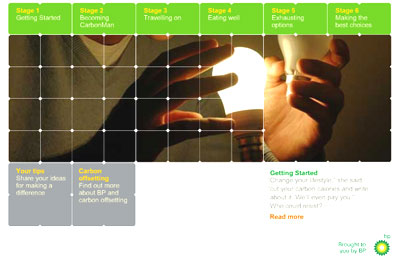
Published on Guardian Unlimited
"CHANGE YOUR LIFESTYLE," she said, "cut your carbon calories and write about it. We'll even pay you." Who could resist?
I am the official Guardian Unlimited carbon guinea pig (sponsored, perhaps a tad ironically, by BP, which, incidentally I have nothing to do with). Over the next two months I will be trying to reduce my carbon footprint - how much climate-changing CO2 I am responsible for - as much as possible.
It's all in aid of our battle against global warming. A battle, which to be frank, I think we lost a long time ago. Cutting back now, after a century and a half of pumping out carbon dioxide and methane - the two most culpable 'greenhouse gases' - seems to me like shutting the stable door after the horse has bolted, run across the county, converted an old barn into a stud and retired.
But I'll try to keep my cynicism healthily sceptical.
First, what do I know about climate change? Well, I used to think I knew a fair bit.
As a student in the mid-90s I studied glaciers in the Indian Himalaya and also in Bolivia. Both lots were shrinking rapidly, and had been since the mid-1800s.
It was, we learned, all part of the normal ebb and flow of the climate. During the last glaciation, the ice sheets stretched from the North Pole to north London. Sea levels were so low humans could simply walk from Asia to America. It is the natural way of things.
Doom-laden headlines predicting climate catastrophe were to be taken with a heavy dose of salt, we were told, if not ignored altogether.
But we now know more about how climate changes. Take for example ice cores in Antarctica that stretch back 650,000 years. Scientists have analysed air trapped in tiny bubbles from these, and plotted how much CO2 and methane there has been in the atmosphere over time. The results show there has never been as much CO2 and methane in our atmosphere as there is today. We are in uncharted territory.
The ice records also show that climate can change quickly, within the scope of one lifetime. The different types of pollen grains that occur as climate changes, and are now preserved in the ice, illustrate how ecosystems can react dramatically.
The stories in the news today - Spring getting earlier, banana trees fruiting in Devon, Great White sharks off Cornwall - illustrate that that is what is happening now. They whisper, rather than shout, but taken together with shrinking ice fields, retreating glaciers, disappearing tropical islands and ever bigger storms and floods, the message is clear: the climate is changing, and it's changing fast.
But really, what can we do about it? Hasn't the damage already been done? Can we really turn back the clock on 150-years of industrialisation?
The Intergovernmental Panel on Climate Change (IPCC) says carbon dioxide is on the way up regardless of what we do. Even under their best-case scenario of cutting CO2 levels back to 1990 levels, CO2 emissions by 2040 will be 29 billion tonnes. If we do nothing, they say, and China and India start to consume Western levels of energy, emissions will peak at 108 billion tonnes in 2080. Isn't it all just a little bit late?
Probably yes, says the UK Met Office on their cheery Plain English website about global warming. But don't let that put you off, it adds. Instead of sticking our heads in the newly scorched sand, we need to act collectively and responsibly. That way we might not stop the flood, but we will stop adding fuel to the fire.
The figures also reveal another reason why we in the West at least should take a long hard look at ourselves.
Global CO2 output is about 25 billion tonnes a year. Global population is six billion. That's 4.16 tonnes of CO2 each.
According to the New Scientist, each year the average British person adds 10 tonnes (10,000kg) of CO2 to the atmosphere. In the USA it's over 15 tonnes each. In Africa it's less than 1,000kg a person.
Clearly that balance is unfair and, given finite resources, unsustainable. There is a responsibility to the planet, other people and future generations to stop being so wasteful.
So how do you reduce your carbon footprint? Well, first it's good to know what it actually is.
There are lots of online calculators that can work it out, and it is strangely addictive. They take most of the normal things into account - travel, cars, energy use, size of your household etc.
My first go tells me my carbon footprint is 19.9 tonnes. That's double the national average. It's mainly down to flying to Brazil earlier this year and taking internal flights so I could see the Amazon (please, don't write in, I get the message). Those flights produced 9.8 tonnes of CO2. Very soon, because I can't bear it for long, I will look into how I can accept responsibility for the emissions I create by offsetting them. And I'll be thinking about how I can reduce the carbon output of all the journeys I make, and finding the most responsible form of transport I can.
But in the meantime I'm going to stick the washing on warm, not hot, switch off my TV instead of leaving it on standby, cycle everywhere, eat less meat and take cold showers. You're welcome to join me in all those things. And feel free to email me and add more to my list. I want to make my life as climate friendly as I can.








0 comments:
Post a Comment